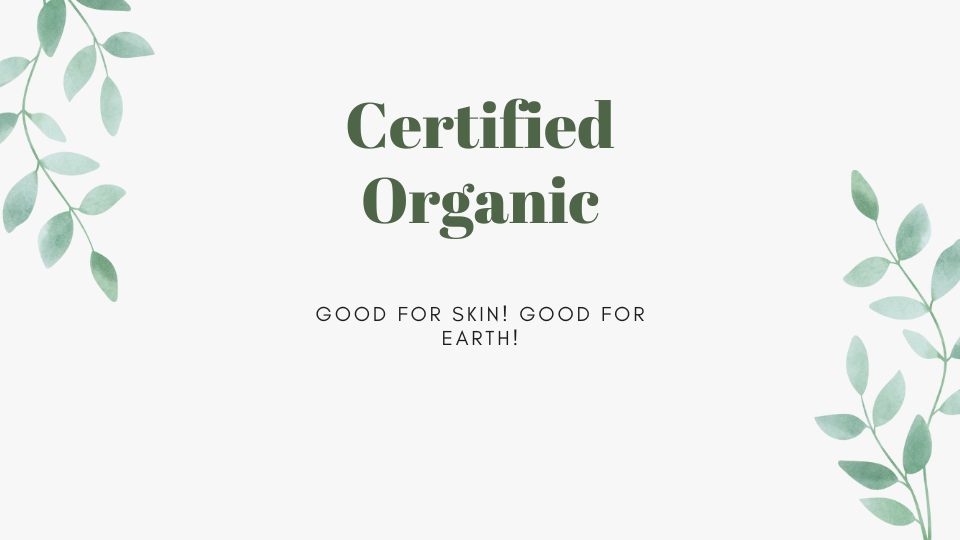
Embracing Certified Organic Skincare: A Natural Path to Radiant Skin
Embrace purity and sustainability with certified organic skincare—a movement transforming beauty norms by championing health for both the skin and the planet.
In recent years, the organic movement has swept through grocery stores and farm markets, emphasizing the importance of consuming food that is free of harmful pesticides, synthetic fertilizers, and genetically modified organisms (GMOs). However, this focus on organic ingredients shouldn't stop at the kitchen. The organic principle is equally important in skincare, since what you put on your body can be just as crucial as what you put in it. The skin is the body's largest organ and it has a tremendous capacity to absorb the substances applied to it. Research indicates that the skin can absorb up to 60% of the chemicals in products that come into contact with it, and these compounds can enter the bloodstream and circulate throughout the body. Given this ability, the substances we apply to our skin should be as wholesome and safe as the food we eat. Hence, In an age where the beauty industry is flooded with products boasting miraculous results, discerning consumers are turning back to nature. Certified organic skincare has emerged not just as a trend, but as a fundamental approach to achieving and maintaining radiant health and a vibrant appearance.
The Rise of Organic Skincare
The increasing popularity of organic skincare is a direct result of heightened awareness regarding the negative impacts of synthetic chemicals commonly found in traditional beauty products. Chemicals like parabens, sulfates, and phthalates are associated with various health problems, ranging from allergic reactions to hormonal disruptions. As awareness grows, so does the appeal of organic skincare, which is prized for its purity and effectiveness.
Benefits of Certified Organic Skincare
- Reduced Risk of Allergic Reactions: Organic products are typically free from harsh chemicals, making them a safer choice for people with sensitive skin.
- No Hormonal Disruptions: Natural ingredients mean there are no harmful chemicals that could potentially disrupt hormonal balance.
- Skin Health: Organic skincare products are gentle on the skin. They are free from harsh chemicals that can strip the skin of its natural oils and disrupt the delicate balance of the skin barrier. Instead, the rich antioxidants present in certified organic skincare combat free radicals, preventing premature aging and promoting overall skin health. Pure, organic ingredients provide essential nutrients that nourish the skin, enhancing its resilience and radiance. Regular use of organic skincare can contribute to a more youthful and vibrant complexion.
- High quality ingredients: Free of harmful chemicals: Free from harmful ingredients like parabens, phthalates, sulfates, and synthetic fragrances, certified organic skincare products boast high-quality, nutrient-rich ingredients. These formulations harness the power of nature, incorporating plant extracts, plant oils, and herbal infusions. The absence of fillers allows for a higher concentration of active ingredients, ensuring that each application delivers maximum benefits to the skin.
- Effective and economical in the long run: Compared to their non-organic counterparts, organic skincare products are made with a long list of active natural ingredients, making them potent and effective towards their cause; hence one tends to use less, and a little goes a long way.
- Cruelty-Free Commitment: Certified organic skincare brands like Spin Organics are often committed to cruelty-free practices. They refrain from testing their products on animals, promoting ethical and humane treatment in the beauty industry. Choosing certified organic skincare reflects a compassionate stance towards both the environment and living beings.
- Environmental Impact: The production of certified organic skincare products minimizes the environmental footprint. By avoiding the use of synthetic chemicals, these products contribute to cleaner air, soil, and water. Additionally, sustainable packaging practices from brands like Spin Organics further reduce waste, emphasizing a commitment to environmental responsibility.
While certified organic skincare offers numerous benefits for both skin health and the environment, it's crucial to recognize the distinction between organic and certified organic skincare products.
What does certified organic mean?
Certified organic skincare products meet stringent standards set by certification bodies. These standards dictate how the ingredients are grown, harvested, processed, manufactured and handled. To be labeled as certified organic, a product must contain a high percentage of organic ingredients (typically above 95%) and comply with a list of requirements that do not allow the use of synthetic additives, pesticides, chemical fertilizers, and GMOs. Certification also often involves ensuring that the product is free from harmful processes, contaminants and that the processing facility undergoes annual inspection by the certifying body. Certifying bodies vary by country and region but include organizations like the USDA Organic in the United States, ECOCERT in France, and ACO (Australian Certified Organic) in Australia. These organizations provide a certification mark that can be displayed on products that meet their criteria, giving consumers confidence in the product's organic claims.
The term "organic," when not accompanied by a certification, can be less definitive, in some instances even deceptive. It generally indicates that some organic ingredients are used, but without certification, there is no guarantee about the percentage of organic content or the exclusion of non-organic ingredients. Furthermore, the use of the term "organic" alone is not quite regulated, and practices such as using organic ingredients alongside numerous chemical additives can occur or rather is common practice.
Conclusion:
In a world where self-care and environmental consciousness converge, certified organic skincare emerges as a natural and responsible choice. Beyond the promise of glowing skin, it embodies a commitment to health, purity, and sustainability. By choosing certified organic skincare, individuals not only nurture their skin but also contribute to a healthier planet, paving the way for a more harmonious coexistence with nature.

